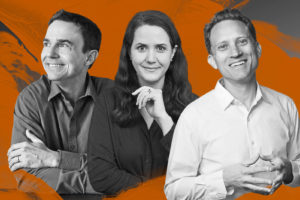Each year, the university recognizes professors who are committed to great teaching. These instructors stand out for how they inspire undergraduates to focus beyond good grades and learn to think.
Galileo, known as the father of modern science, once said, “You cannot teach a man anything; you can only help him find it within himself.” This ethos holds true for all of the 2019-20 recipients of the President’s Associates Teaching Excellence Awards.
Although they come from disciplines as diverse as genetics and geography, they all share a common goal — truly engaging their students. They pride themselves on their commitment to adapt and reach students to create the best learning environments.
We spoke with these seven outstanding professors about their classrooms. They recognized that teaching is not a one-way street, and to be great teachers they must also be great listeners. Here is what they have learned from listening to their classrooms.
Jason Brownlee — Professor, Department of Government
GOV 312L: Issues & Policies in American Government: America in the Middle East || GOV 365N: Capitalism, Socialism and Democracy
“What I’ve really learned from the students is that wisdom emerges from the intersection of academic knowledge and real-world experience. When we come together in class, we really have an opportunity that’s rare to bring together different people and combine their perspectives, which allows us to see our society and government more clearly than any of us would be able to do on our own.”
What I’ve really learned from the students is that wisdom emerges from the intersection of academic knowledge and real-world experience.”
Marci Gleason — Associate Professor, Department of Human Development and Family Sciences
HDF 304: Family Relationships
“What I’ve learned in the classroom is that you get what you put in. If I am approaching them with curiosity and interest, they will approach me with curiosity and interest. We do have to memorize, yes, but also I want them to recognize how to make that leap beyond just learning what the theory says or what the experiment found, to how to apply it.”
If I am approaching them with curiosity and interest, they will approach me with curiosity and interest.”
Michael Drew — Associate Professor, Department of Neuroscience
NEU 335: Neural Systems II
“One of the nice things about teaching is that you’re constantly reminded of how vast the spaces of the unknown are, especially in neuroscience. Almost every day we run up against the limits of our knowledge. Students are asking questions that I don’t know the answer to, and that is why I encourage them to contribute to research. There are a lot of questions that need to be answered, and we need people to try to answer them.”
There are a lot of questions that need to be answered, and we need people to try to answer them.”
Janice Fischer — Professor, Department of Molecular Biosciences
BIO 325: Genetics
“What I’ve learned is I want to create an environment where students are rewarded for thinking. I want them to understand things so that they can solve problems because that’s going to be their experience in real life. For example, they take assessments at home and use whatever they want to solve the problem, you know, why memorize anything? In real life, you’ve got a cellphone! The old way just doesn’t make sense anymore.”
What I’ve learned is I want to create an environment where students are rewarded for thinking.”
Scott Stroud — Associate Professor, Department of Communication Studies
Program Director of Media Ethics at the Center for Media Engagement || Founding Director of the Media Ethics Initiative
CMS 322E: Communication Ethics || UGS 302: Art, Criticism and Society
“Philosophers have been wrestling with ethics in the West for 2,500 years and in China and India for over 3,000. The debate is something that’s always been with us. I constantly learn ethical questions are never solved. Our students are wonderful at showing that there are a variety of ways reasonable people can disagree on important topics.”
Our students are wonderful at showing that there are a variety of ways reasonable people can disagree on important topics.”
Vernita Gordon — Associate Professor, Department of Physics
PHY 110C: Conference Course || PHY 321: Modern Physics Plan II || PHY 301: Mechanics
“I’ve learned that our students are really hardworking, and we need to support them. Many times someone who wasn’t doing well in my class was doing more than any human could ever be expected to do. They were working super hard. Maybe they had a 40-hour-a-week job as a waitress. I do everything I can to contact students who aren’t doing well in my class so we can figure out a way to improve. I remember the times when people were patient with me and gave me grace; it made a huge difference for me.”
I remember the times when people were patient with me and gave me grace; it made a huge difference for me.”
Gregory Knapp — Associate Professor, Department of Geography and the Environment
GRG 319/LAS 319: Geography of Latin America || GRG 323K/LAS 330: South America: Nature, Society and Sustainability (Ecuador Maymester)
“In my smaller courses, students actually take charge of proctoring the class, and they have a lot of power in determining the course of the discussion, even the materials that we use. They are so involved and engaged that I can leave the classroom and they won’t even notice that I’m gone, and that’s great! In that class, my goal is for them to empower themselves, because I’m not going to be there in the future.”
Additional Courses: GRG 331K/ANT 324L: Nature, Society and Adaptation ||LA 119: International Learning Seminars ||UGS 303: Latin America: Environmental History and Sustainability ||
My goal is for them to empower themselves, because I’m not going to be there in the future.”




